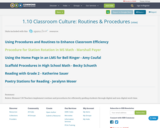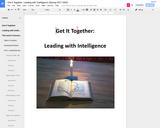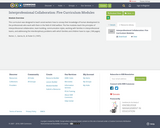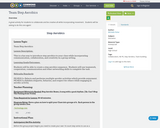
Rubric Element 1.10 Teachers implement routines and procedures for efficiently guiding students through digital and non-digital work time.
- Subject:
- Education
- Material Type:
- Primary Source
- Date Added:
- 07/20/2018

Rubric Element 1.10 Teachers implement routines and procedures for efficiently guiding students through digital and non-digital work time.

This review of leadership literature and materials was completed by the Spring 2017 Honors Leadership Development course at Central Lakes College in Brainerd, MN. The text contains a review of materials relevant to those studying the topic of leadership. It contains materials on traits and skills of leaders, ethical characteristics of leaders, leadership and emotional intelligence, effective communication, motivating groups, building cohesive groups, creating and utilizing effective goals, effective decision making, initiating change, empowering others, and historical approaches to leadership.

This curriculum was designed to teach social workers how to convey their knowledge of human development to the professionals who work with them in the field of child welfare. The five modules teach the principles of interprofessional collaboration, team building, communication styles, working with families in interprofessional teams, and addressing the interdisciplinary problems with which families and children have to cope. (188 pages)Rector, C., Garcia, B., & Foster D. (1997).

The nuts and bolts of preparing a New Venture Plan and launching the venture will be explored in this twenty-fifth annual course offering. The course is open to members of the MIT Community and to others interested in entrepreneurship. It is particularly recommended for persons who are interested in starting or are involved in a new business or venture. Because some of the speakers will be judges of the MIT $100K Entrepreneurship Competition, persons who are planning to enter the Competition should find the course particularly useful. In the past approximately 50% of the class has been from the Engineering / Science / Architecture Schools and 50% from the Sloan School of Management.
The course is offered during the Independent Activities Period (IAP), which is a special 4-week term at MIT that runs from the first week of January until the end of the month.

The Team Project has the goals of (1) developing teamwork and leadership skills and (2) learning from the analysis of a change initiative in a real-world company using concepts from other core courses. This class has no regular class schedule or weekly readings. Almost everything is oriented around your team and your project, with only a few deadlines. Each team is responsible for analyzing a recent, ongoing, or anticipated initiative at a real company. Examples might be a strategic reorientation, organizational restructuring, introduction of a new technology, or worker participation program.
This course is closely integrated with other MBA core classes: readings are assigned through Organizational Processes (15.311) and oral presentations are given in Communication for Managers (15.280).

A great activity for students to collaborate and be creative all while incorporating movement. Students will be asking to do this one again!

This activity helps students learn about communication competence and improve their computer-mediated communication competence skills. Students understand the importance of collaboration, team-building skills, and negotiation. The digital game, Minecraft, is used to help students craft better messages.